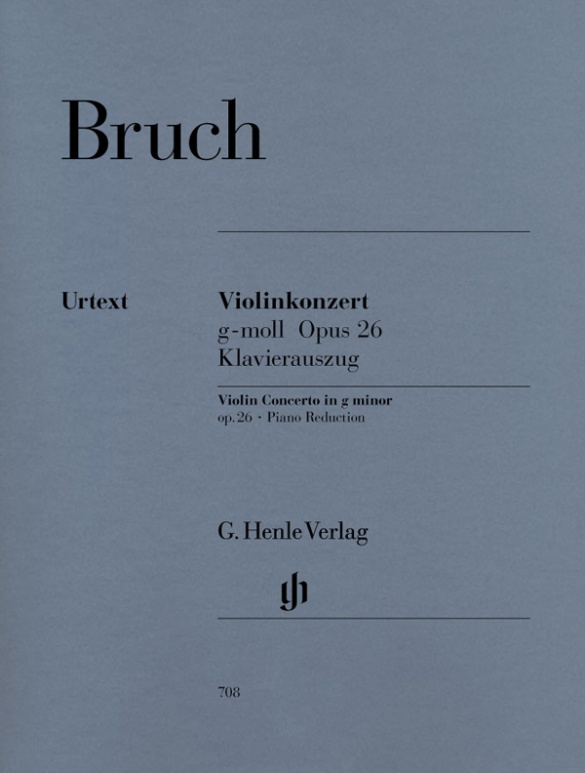

Max Bruch
Concerto pour violon en sol mineur op. 26
Il a rendu célèbre son compositeur, enrichi d’une oeuvre grandiose le répertoire violonistique, et, qui plus est, il est enfin publié chez Henle: c’est le premier Concerto pour violon en sol mineur de Max Bruch. Même si Bruch luimême n’a pas toujours apprécié la grande popularité dont jouis-sait son oeuvre - «Je ne supporte plus d’entendre ce concerto; n’aije donc écrit que ce seul concerto?», écrit-il irrité à Simrock, son éditeur -, il n’en reste pas moins que l’oeuvre ne peut plus guère être bannie des salles de concert. L’édition Henle fournit un texte exemplaire pour la partie de violon. La préface elle aussi suffirait à justifier l’achat: qui sait en effet que le concerto de Bruch a connu une genèse des plus compliquées, marquée de plusieurs étapes de révision, et que certaines des corrections apportées sont dues au célèbre violoniste Joseph Joachim?
CONTENU/DÉTAILS
(Explanation)
Exclusively in the Henle Library APP
Doigtés de: Vadim Gluzman, Rudens Turku, Tianwa Yang
CONCERNANT LE COMPOSITEUR
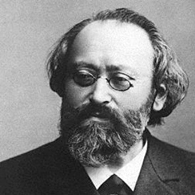
Max Bruch
Compositeur allemand de l’ère romantique. Ses œuvres esquissent au plan stylistique une esthétique opposée à celle de la Nouvelle école allemande. Ses concertos pour violons occupent une place importante. Il composa en outre de nombreuses œuvres chorales, cantates, oratorios, lieder, œuvres pour la scène ainsi que des œuvres orchestrales.
| 1838 | Né le 6 janvier à Cologne. Sa mère, cantatrice, lui donne ses premières leçons de musique. |
| à partir de 1849 | Il étudie la musique auprès de Heinrich Carl Breidenstein. Un grand nombre de compositions datent de son enfance. |
| 1852 | Boursier de la Fondation Mozart à Francfort. |
| 1853–57 | Études de composition auprès de Ferdinand Hiller à Cologne. |
| 1858 | Création à Cologne de l’opéra «Scherz, List und Rache» op. 1. |
| à partir de 1858 | Il fréquente à Leipzig le cercle de Mendelssohn. |
| 1862 | Déménagement à Mannheim. |
| 1863 | Création à Mannheim de l’opéra «Die Loreley» op. 16. |
| 1865–67 | Directeur de la musique à Coblence. Composition du 1er Concerto pour violon en Sol mineur op. 26. |
| 1867–70 | Maître de chapelle à la cour de Sondershausen. Composition de la 1re Symphonie en Mi bémol majeur op. 28 dédiée à Johannes Brahms et de la 2e Symphonie en Fa mineur op. 36 (les deux en 1870). |
| 1870–78 | Compositeur indépendant à Berlin et à Bonn. Composition de l’oratorio «Odysseus» op. 41 (1871/72). |
| 1879/80 | Composition de la Fantaisie en Mi bémol majeur pour violon et orchestre op. 46 (Fantaisie écossaise). |
| 1880–83 | Directeur de la Philharmonic Society à Liverpool. |
| à partir de 1883 | Voyage aux USA. Directeur de l’Orchesterverein de Breslau. |
| à partir de 1891 | Directeur de la classe d’excellence de composition à l’Académie des Beaux-Arts de Berlin. Docteur honoris causa de l’université de Cambridge (1893) et membre correspondant de l’Académie des Beaux-Arts (1898). |
| 1907 | Vice-président de l’Académie des Beaux-Arts de Berlin. |
| 1920 | Meurt le 2 octobre à Berlin. |
About the Authors
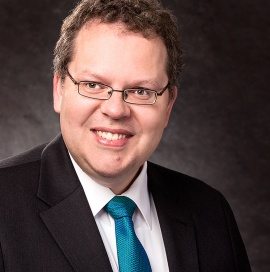
Michael Kube (Editeur)
Dr. Michael Kube, born in 1968 in Kiel, studied musicology (with Friedhelm Krummacher and Heinrich W. Schwab), the history of art and ethnology at the Christian-Albrechts-Universität zu Kiel. Since 1998 he has been a research associate at the New Schubert Edition (Tübingen) and since autumn 2002 also a member of the editorial board.
Kube is on the panels of different juries and music prizes, and is also a member of the Committee for work evaluation (Werkprüfungsausschuss) of VG Music Edition. His research interests include music for keyboard instruments around 1700, 19th century chamber music, early 20th century music history, as well as Scandinavian music history.
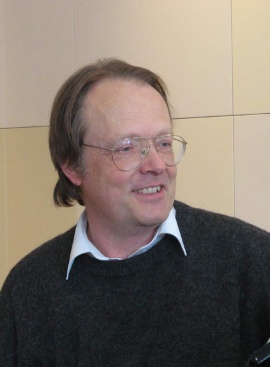
Johannes Umbreit (Réduction pour piano)
Prof. Johannes Umbreit studied the piano at the Musikhochschule in Munich. From 1987 onwards he was a regular accompanist at courses given by Wolfgang Schneiderhan, Thomas Brandis, Ljerko Spiller, Igor Ozim, Olga Woitowa, Ernő Sebestyén, Walter Nothas, F. Andrejevsky, Denis Zsigmondy and Zakhar Bron amongst others. He has appeared in numerous radio and TV broadcasts and plays chamber music with members of the Bavarian State Orchestra, the Munich Philharmonic Orchestra and the Bavarian Radio Symphony Orchestra.
He is on the jury of different international competitions and has been invited to several international music festivals. Umbreit was a teacher for almost ten years at the Musikhochschule in Munich and at the same time a lecturer for chamber music and piano accompaniment at the Richard Strauss Conservatory. Since 2008 he has been a lecturer at the Hochschule für Musik und Theater München. As the long-serving managing director of the Richard-Strauss-Gesellschaft, he was made an honorary member of the board in 2009. In May 2011, the Bavarian Minister of Culture appointed Johannes Umbreit an honorary professor of the Hochschule für Musik und Theater München on the suggestion of its academic senate.
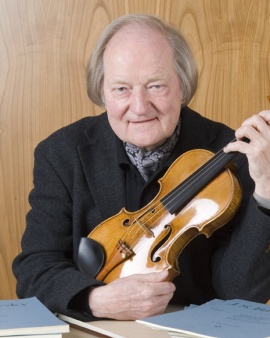
Kurt Guntner (Doigtés violon)
Prof. Kurt Guntner was born in Munich on Mozart’s 183rd birthday. He studied the violin with Ludwig Ackermann, Max Rostal and Henryk Szeryng. At the age of 18, he made his solo debut in the Kongreßsaal at the German Museum in Munich, performing Beethoven’s Violin Concerto with the Munich Philharmonic Orchestra. At the age of 22 he was appointed first concertmaster with the Bavarian State Orchestra. After 10 eventful years at the Bavarian State Opera with conductors such as Ferenc Fricsay, Joseph Keilberth and Hans Knappertsbusch, Rudolf Kempe invited him to become the first concertmaster with the Munich Philharmonic Orchestra, giving him the opportunity to perform the violin solo in many of the great violin concertos.
Of particular appeal were the BR’s invitations to perform and record great violin concertos that were seldom played, including those by Casella, Schillings, Szymanowsky. Kurt Eichhorn initiated this series– Jan Koetsier, Marek Janowski and others conducted other concertos. Kurt Guntner was also first concertmaster with the Bayreuth Festival Orchestra for many years, and played with the Munich Bach Orchestra under Karl Richter, in the Association of Soloists in The Bach Week in Ansbach and with the Münchner Bachsolisten. In 1972 he founded the internationally acclaimed ODEON-TRIO, together with the cellist Angelica May and the pianist Leonard Hokanson, touring all over the world with them for 25 years. In 1976 Guntner was called to the tenured chair of violin at Munich’s Hochschule für Musik und Theater, teaching students from around the world for 28 years.
He made numerous recordings for radio, television, record and CD. Karl Schumann described Guntner’s broad musical personality thus: “Kurt Guntner is a practical orchestral musician, soloist, chamber musician and educator in one person”.
In 1997 Kurt Guntner was awarded the order of merit (first class) of the Federal Republic of Germany.
Kurt Guntner died on 9 January 2015 in Munich.
He was closely associated with G. Henle Publishers for several decades. Since the end of the 1980s he had produced numerous Urtext editions of works for violin for the publishing house, sharing pedagogically polished bowings and fingerings for different works including violin concertos by Bach, Haydn, Mozart, Bruch and Tchaikovsky, as well as numerous other editions.
Informations sur la sécurité du produit

G. Henle Verlag
Vous trouverez ici des informations sur le fabricant du produit.G. Henle Verlag e.K.
Forstenrieder Allee 122
81476 München
Allemagne
info@henle.de
www.henle.com
With extensive informative notes about different editions of the score, this is a well-produced edition of a popular repertoire item.
AUSTA Stringendo, 2017The complex genesis of the work is unravelled in a comprehensive preface and all the various sources have been scrutinized in producing this fine edition.
Sheet Music, Winter 2003recommandations
autogenerated_cross_selling
Autres éditions de ce titre
Autres éditions de ce titre


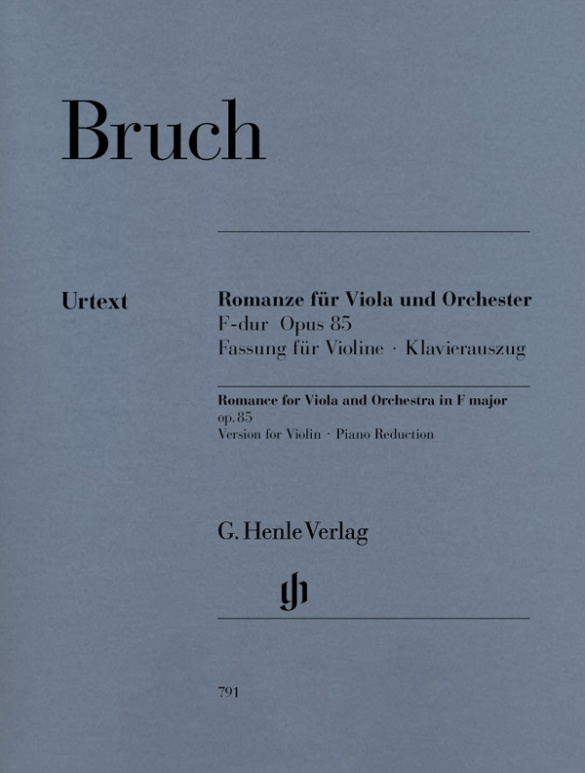

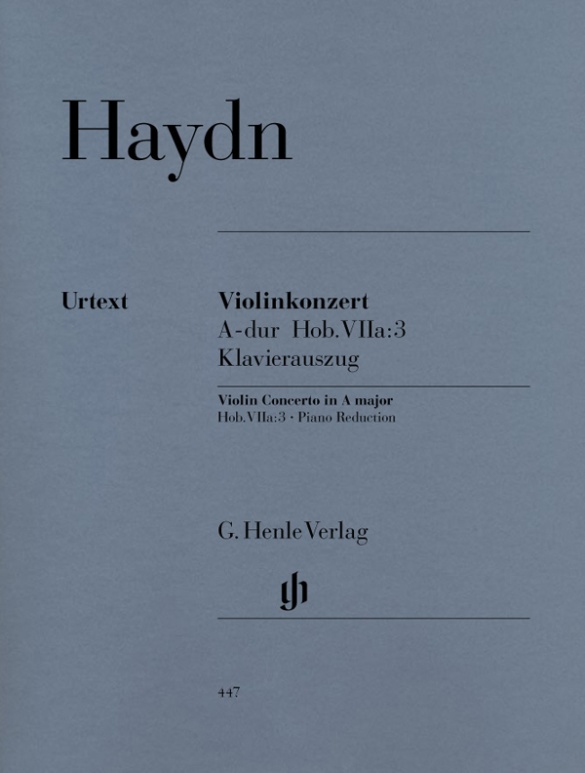
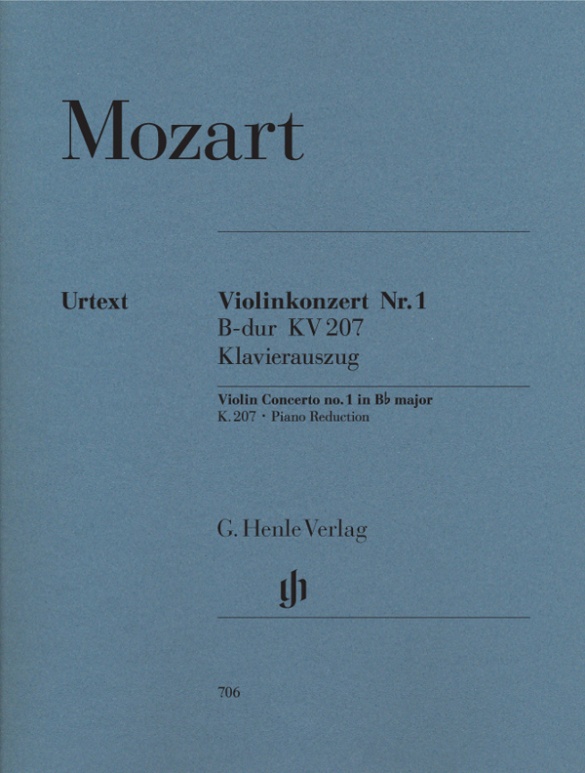
parties avec ou sans indications de doigté
Matériel d'orchestre chez Breitkopf & Härtel